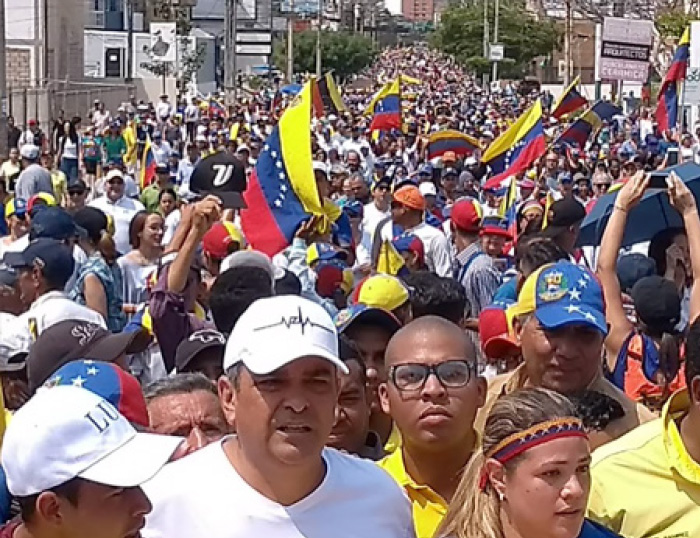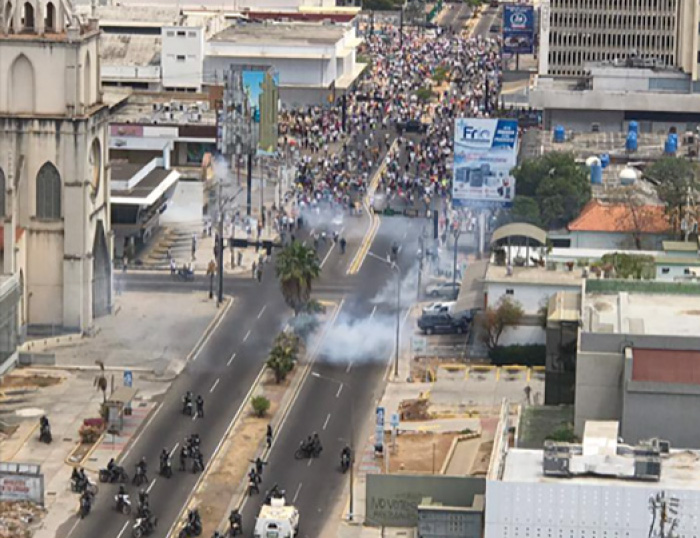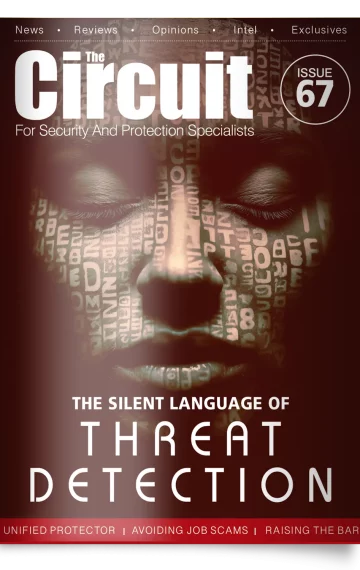On the morning of April 30th, 2019 Venezuela’s opposition leader Juan Guaidó seemed to attempt a coup d’état against the communist government of Nicolás Maduro.
I use the word ‘seemed’ as what occurred can be best described as a publicity stunt more than an actual coup d’état. For the remainder of the day, even those that thought they knew what was going on in Venezuela, really, had no idea what was going on. While social media and the news channels were touting a revolution in Caracas, life went on as normal on the military bases and for the rest of Venezuela. Guaidó’s attempted overthrow was mostly just another demonstration that is all too common in Caracas.
One the day of Guaidó’s publicity stunt Nicolás Maduro was strangely absent until late in the day. Rumors were swirling that he had left or was leaving the country. Did his Cuban bodyguards take Guaidó’s actions seriously and isolate Maduro until the all-clear was given? Maybe. I am sure that the Caucasian-looking, Russian-speakers on the streets of Caracas, wearing Venezuelan National Guard uniforms, were keeping Maduro’s security team and others informed on all the developments with Guaidó’s fiasco.
Whether Nicolás Maduro was planning to leave Venezuela is a matter for debate, and only a select few know the facts. Maybe some of the passengers on the Bombardier Global Express, which landed in Maiquetía that evening, around 8pm, after a direct flight from Moscow, would know the answer. Did the passengers of that plane meet with Maduro and clarify to him that he was not leaving the country, again, who knows? But Maduro is still in power and in the following days was seen dancing with his supporters and parading with the military.
For the past few months, there have been rumors and news reports about an imminent invasion of Venezuela by U.S. forces and its allies. Even Eric Prince, the former owner of the now-defunct Blackwater, got in on the action apparently stating that with 5000 mercenaries he could take the country from Maduro! All this sounds cool and is good for publicity, ratings, and likes on social media but, is it feasible, in reality, or a complete fantasy? I lean towards the latter.
The Ground
Venezuela, unlike Iraq, Afghanistan, and Syria, is a hilly and densely vegetated country with limited roads in many parts. To comprehend Venezuela’s terrain from a military point of view, you want to think Vietnam, not Iraq. Venezuela’s terrain is ideal for guerrilla warfare as heavily equipped conventional troops, and security forces will be channeled for ambushes on limited routes, and the abundant vegetation will provide ample cover for attackers. The Colombian military and security forces have been trying for years to control their borders with Venezuela, but still today most of those areas are lawless badlands controlled by narcos, guerrillas, and gangsters.
As for the cities such as Caracas; to clear and control the militarily would be a considerable challenge due to its terrain, limited main roads, and its wealth of favelas/barrios. Most of these favelas/barrios are controlled by their own well-armed gangs; any outsiders entering the maze of alleyways are quickly targeted. To understand the issues which come from operating in such environments take a look at how the Brazilian security forces work in the favelas of Rio and Sao Paulo. Troops that are not explicitly trained to operate in such environments, not fit enough, and don’t know their way around, would be chewed up and if lucky, spat out!
The Population
Do most Venezuelans support the opposition? Well, I think that like everyone else, they would support someone who would give them a better quality of life, but are Venezuelans willing to fight for it? I think not. Yes, they will turn up to rallies, wave their flags, and share their photos and videos on social media but, when the evening comes, and it starts to get dark, they go home. Their priorities, like most people from the Caribbean and Latin America, are earning enough money to live, drink, f#ck, and party. What else do you need in life…?
From a military and cultural perspective, one of the vast differences between the wars in the Middle East and a potential war in Venezuela is the religion of the populations. While most in the U.S. and Europe have little cultural connection with the Muslims killed and suffering in the Middle Eastern wars, I think there would be a lot more public outrage if Hispanic Catholics were being shot, bombed, killed, and classed as collateral damage.
The Opposition
Juan Guaidó seems to have the support of the U.S. and their allies but not that of the Venezuelan people. Guaidó and his people all seem to be photogenic, wealthy and educated individuals whereas Nicolás Maduro was a bus driver, and the former Venezuelan President, Hugo Chávez, a career soldier, both from humble backgrounds and I don’t think either of them would ever make the front cover of Vogue Magazine.
I don’t think it’s difficult to see why most Venezuelans can relate more to Maduro, and his predecessor, Chávez, than they can to Guaidó. I think Guaidó’s opposition is more in tune with drumming up donations from the socialites of Miami, Washington DC, and New York, than fighting what would be a very dirty war.

Blackwater’s 5000
If anyone with any military experience or knowledge can seriously think they could take control of a country like Venezuela with only 5000 well trained and equipped troops, I would say they must be delusional. If anyone were to think, in these days, that they could raise a 5000 strong mercenary force to take control of a country like Venezuela, I would say they must be smoking crack.
The now-defunct Blackwater was a security company that supplied guards to the U.S. Department of Defense, etc., they were not a mercenary force. They operated within U.S. guidelines for the U.S. government.
Blackwater/Xe Services/Academi was reportedly in charge of running the training for the U.S.’s counternarcotics program in Afghanistan. Their achievements are questionable as we all know opium production in Afghanistan is booming.
Blackwater/Xe Services/Academi was connected with supplying troops for Saudi Arabia’s war in Yemen. That war is not going the way the Saudis, and their allies intended, even with all the money they are spending.
To arm and equip a large mercenary force without government backing would require violating numerous international laws, including arms trafficking to start with.
Security companies operating in Iraq and Afghanistan, etc. have had protection, to some degree, from prosecution, for any incidents they have been involved in, though guards have been held accountable and jailed for using force that has been deemed as excessive.
Anyone that follows military events and news will know that there are regular soldiers from the U.S. and U.K. being charged or are in jail for incidents that took place while on active duty. So, let’s say hypothetically a mercenary force is involved in offensive operations where there are civilians killed; just your regular collateral damage, which is to be expected in a war. Do you think for a second that no-one will try to prosecute these mercenaries for using excessive force, violating human rights, etc.? And when they do return to their countries and have to face the legal ramifications of their actions do you think the company that hired them will be paying their legal bills? I think we all know the answer to that one.
When security companies are working in Iraq and Afghanistan on government contracts, they have access to medical and life insurance programs for their guards, but not so with mercenary operations. Trying to get decent insurance for armed international close protection work is extremely expensive, if not impossible; how will anyone insure a mercenary operation that will undoubtedly be suffering casualties. Insurance for decent medical and aftercare for those wounded would also be costly if any insurance companies would be willing to write the policy. Repatriating bodies takes a lot of logistics and is expensive; from a business perspective, it’s far better to bury in place. I strongly suggest you check the fine print and validity of any medical or life insurance policies if you decide to partake in such mercenary adventures!
I have already heard that security companies are recruiting for operations in Venezuela; sure, this makes good bar talk over a few beers but anything more than that I would say find yourself something more constructive to focus on.

Armed Groups
In addition to the Venezuelan police, army, national guard, and intelligence services, there are an array of foreign forces who have been training there for years. The Russians have been highlighted recently, but also the Chinese, North Koreans, and Hezbollah are active within the country. There are numerous photos online of South East Asians in Venezuelan military, and their own, national military uniforms. Will these foreign soldiers fight for Venezuela in the event of an invasion? Well, I think it’s in their interest to do so.
There are many videos online poking fun at the Venezuelan Militias, but in a guerrilla war in the tight alleys of the favelas, anyone putting lead in your general direction can cause casualties. At the other extreme, within the Venezuelan Armed forces there are well trained, equipped and motivated troops that have been preparing for a foreign invasion for a long time.
I recently wrote an article about some of the main narco and terrorist organizations within Venezuela (https://tohff.com/2019/02/28/venezuela-narco-state/), and I will be writing more on the subject soon.
Within Venezuela, as within all narco-states, parts of the country are controlled by armed gangs of terrorists, criminals, or, as they are locally known “Colectivos,” who to some extent are operating with the government’s consent. In many places, these armed gangs outnumber and are better armed and paid than the local police and military forces.
This is where from a strategic perspective, credit needs to be given to the former Venezuelan President, Hugo Chávez. By arming, funding and facilitating these armed gangs, he essentially bought the government a private army. These gangs are well organized, can operate independently, and are embedded within their communities. What they are lacking in conventional military discipline and skills they compensate for with brutality and violence.
Venezuela is a very violent country where death and killing is a way of life for many. Those within the gangs and colectivos are accustomed to taking risks, fighting, and killing. They have an operational command structure and are controlled by their bosses in the Venezuelan prison system or their friends in the intelligence services. For a dirty guerrilla war, these rapists, kidnappers, and murderers would be very effective tools.
Conclusion
Hopefully, you can see from this article the potential issues for an invasion of Venezuela. A war within Venezuela would be a very dirty fight, and most armies these days, by my observations, are not trained for it. Not only that, but they would struggle to operate effectively due to oversight and supervision by politically correct bureaucrats and politicians.
With elections in the U.S. coming up in November 2020 and the Western European political scene in chaos, will the powers that be commit to a war in Venezuela? A war whose cost would be many lives from all sides directly involved; I don’t think so, but I could be very wrong.
Could there be a military solution to removing the communist government of Venezuela, sure but those people, who are capable of doing so, need to decide if they really want it to happen or just use the publicity to promote themselves on social media.
An active measure to start with could be to position a U.S. Navy aircraft carrier in the Southern Caribbean and every night, when the narco flights start transiting to and from Venezuela, send up their fighter jets to blow them out the sky. This might have a much more severe effect on Venezuela’s economy than all the official sanctions, but then, I am sure it would adversely affect the U.S. economy as well!
War in Venezuela
By: Orlando Wilson
Orlando Wilson has worked in the security industry internationally for over 25 years. He has become accustomed to the types of complications that can occur, when dealing with international law enforcement agencies, organized criminal and Mafia groups. He is the chief consultant for Risks Inc. and based in Miami but spends much of his time traveling and providing a wide range of kidnapping prevention and tactical training services to private and government clients.

Leave a Reply